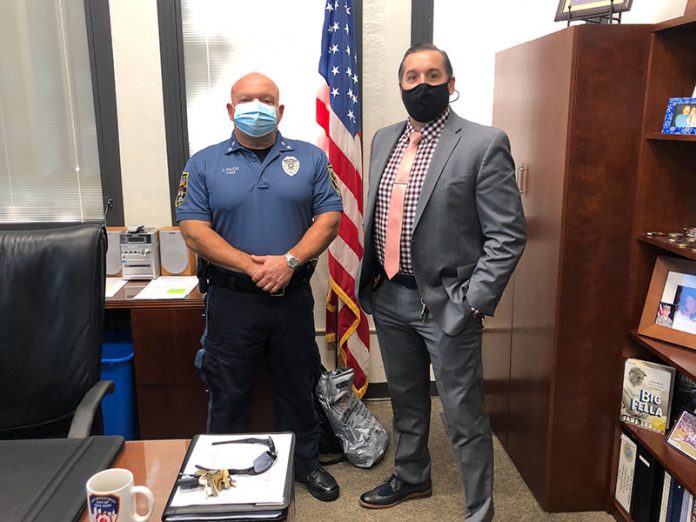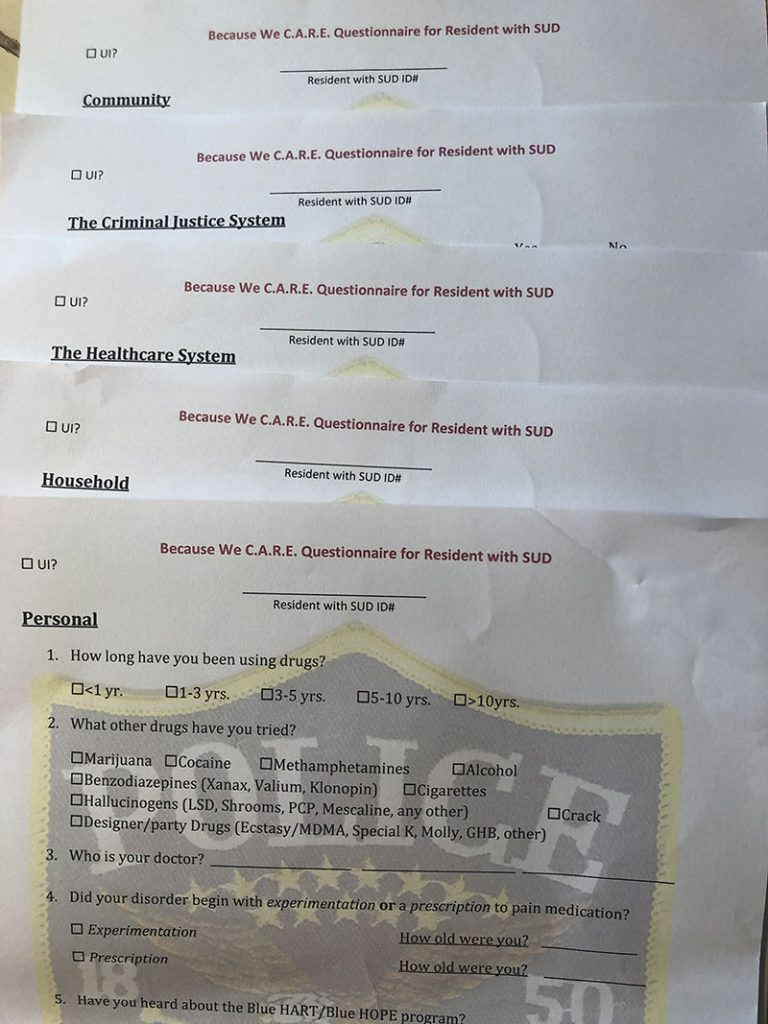
BRICK – What can be done differently to help those who have overdosed on opioids? If the victim tried to get help with their addiction, what kind of roadblocks did they encounter? Was treatment and counseling available? How did they become substance abusers?
Overdose victims have the opportunity to answer these questions and many more in a program started in 2019 by the Brick Police Department, when Chief James Riccio was trying to come up with some new ideas in dealing with the opioid crisis.
The result was “Because We Care” – an overdose follow-up program that is led by Sgt. Jim Kelly, a supervisor in the Community Policing Unit. The two men met in Chief Riccio’s office recently to explain how the program has evolved.
Sgt. Kelly consulted with the Ocean County Health Department (OCHD), the Center for Disease Control, the Ocean County Prosecutor’s Office, and other police departments to develop a questionnaire to be filled out in person at the households where overdoses, both fatal and nonfatal, have occurred.
Chief Riccio said the program drew interest from the OCHD, who jumped onboard and got involved.
Sgt. Kelly, members of the Community Policing Unit and a representative from the OCHD conduct interviews with victims and their families in what has become a public health and public safety collaboration, he explained. So far they have conducted some 40 interviews.
“We collect the data and find common denominators,” Sgt. Kelly said. “We get great feedback from them. The overdose victims get to tell the police what they think about the police in a setting that’s safe for them to do so.”
Chief Riccio said they wanted consistency with the questions so that the same data could be drawn from people.
“The questions evolved,” said Sgt. Kelly. “Our conversations [with overdose victims] made us realize things we hadn’t considered.”
For example, one of the questions on the form asks the overdose victim how they feel they were treated by the criminal justice system and the health care system.
“We didn’t ask how they felt they were treated by the EMTs, so it’s an evolving questionnaire,” he said.
Substance abusers talked about the societal stigma they faced, especially after an overdose. “How could society respond in a way that would be helpful?” Chief Riccio asked.
Sgt. Kelly said that’s true. “Stigma is a huge problem. People won’t seek help. They feel like they’re treated poorly, they feel judged,” he said. “We all bear responsibility.”
Some people were denied the treatment they wanted and needed because of healthcare constraints, the chief said.
The interviews and questionnaires have put certain doctors on the attorney general’s radar as over prescribers of opiates, and has resulted in the removal of one Ocean County physician’s license, Sgt. Kelly said.

One issue that many substance abusers cite during the interviews is a lack of drug education while they were in school. Most said they had only had just one drug prevention program – most often the DARE program for fifth graders.
“They all said we need more programs in schools to address this,” he said. Brick Township Public Schools has added a program for high school seniors called “Not Even Once.”
“So there’s a sweet spot – 7th, 8th and 9th grades – where they need something substantial inserted about addiction,” the sergeant said.
Chief Riccio said real-life stories seem to have the most impact on kids.
The result was an OCHD program, #DrugCode, a one session, interactive program that discusses alcohol, marijuana and vaping in a way that best meets the needs of the students. It was approved by the Brick Board of Education after they saw the data.
“We asked them if they could make room for this in their curriculum,” Sgt. Kelly said. “They were supposed to do it this spring for the freshmen, and then COVID hit.”
“Because We Care” had gathered great momentum, Chief Riccio said. Sgt. Kelly was mentoring five other Ocean County police departments, who were adopting the overdose follow-up program. Brick was applying for grants just before the pandemic.
In Brick, there have been 109 overdoses this year and 11 deaths, up slightly from 2019 when there were 94 overdoses and 18 deaths.
Sgt. Kelly said the interviews started up again about a month ago with coronavirus safety measures in place.






